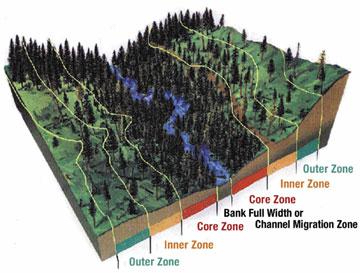forum
library
tutorial
contact

Instead of Stick,
Inslee Offers Carrot on Buffers
by Don Jenkins
Capital Press, January 18, 2023
|
the film forum library tutorial contact |

|
Instead of Stick,
by Don Jenkins
|
Farm Groups Skeptical
 OLYMPIA -- The Inslee administration will try a softer approach to widening the space between farms and waterways, though suspicions linger following last year's failed attempt to force buffers on farmers.
OLYMPIA -- The Inslee administration will try a softer approach to widening the space between farms and waterways, though suspicions linger following last year's failed attempt to force buffers on farmers.
At Gov. Jay Inslee's request, lawmakers will consider legislation to create a new program to pay landowners to voluntarily plant trees and take land out of production.
The state Conservation Commission would oversee the program and set buffer standards, guided by Washington Department of Fish and Wildlife reports.
Inslee has proposed spending $100 million over the first two years to make "monumental progress," the governor's natural resources adviser, Ruth Musgrave, said Wednesday.
"Last year, we introduced a bill that received strong opposition due to the mandatory and compulsory requirements to establish riparian buffers," she told the House Agriculture and Natural Resources Committee.
"This year we're doing something completely different."
Washington already has 66 riparian-related programs, according to a state consultant. Some are voluntary and some are regulatory. Tribal leaders say they have not recovered salmon.
Tribes supported Inslee's mandatory buffer bill, but the legislation flopped. In between sessions, the governor's office involved farm groups in talks about a new buffer bill.
At the bill's first hearing, tribal representatives were lukewarm. Farm lobbyists said they appreciated being consulted, but remained concerned about the possibility of forced buffers.
The bill would create a task force in the governor's office that could recommend new "regulatory programs."
Farmers and ranchers would be on the task force, but the balance of power could favor tribes, environmental groups and state agencies that supported mandatory buffers last year.
Republicans on the committee asked Musgrave whether Inslee's bill would set the stage for agencies to write regulations based on task force recommendations.
"If there's not success in a voluntary program, it could head that way," she said. "We're hoping this is going to a successful program and that we can hold off on or never have to use a regulatory backstop.
"I feel pretty strongly this is going to work," Musgrave said. "Now, if there's no success in the program and no one participates, then we may have to look at it again."
The bill cites a two-volume report by Fish and Wildlife as "the best available science" on riparian buffers. The report would shape the new program.
The first volume includes the case for buffers hundreds of feet wide beginning at the edge of the floodplain. The second volume cautions against automatically requiring such wide buffers in all places.
The bill should not ignore other studies that found narrower buffers can protect fish, Washington State Dairy Federation President Dan Wood said.
"We've never had the legislature say, 'This is the best available science,'" he said.
Wood also criticized the task force's focus on buffers. There are dozens of reasons salmon struggle, he said. "A buffer set aside does not equal more salmon. There is more to it."
The Senate has not yet had a hearing on the legislation, Senate Bill 5266. In the House, the same measure is House Bill 1215.
learn more on topics covered in the film
see the video
read the script
learn the songs
discussion forum
